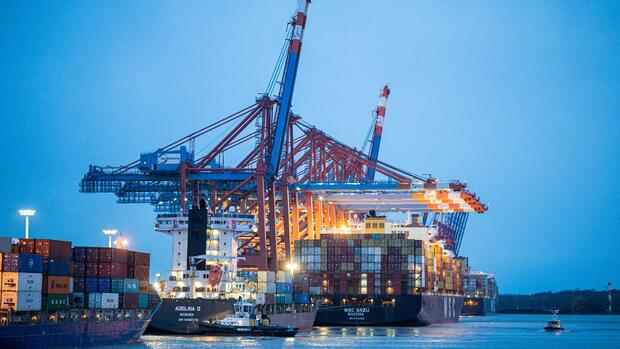The consequences of the war in Ukraine put the German economy under pressure.
(Photo: dpa)
Berlin According to economists, the German economy narrowly avoided a recession in the first quarter despite the Russian war against Ukraine. Gross domestic product is likely to have grown by 0.2 percent quarter-on-quarter from January to March, according to the average economists from twelve banks surveyed by the Reuters news agency.
At the end of 2021, Europe’s largest economy had shrunk by 0.3 percent due to the corona pandemic. If there are two negative quarters in a row, economists speak of a recession. The Federal Statistical Office will publish the first official estimate for the first quarter next Friday.
“Economic growth in Germany probably increased only slightly in the first quarter,” said Helaba economist Stefan Mütze. Before the outbreak of war on February 24, industry was likely to have made a profit, and foreign trade was also likely to have contributed to growth. “The retail trade, on the other hand, is pointing to weak consumption, which is also due to inflation,” says the expert.
In March, the inflation rate climbed to its highest level in 40 years at 7.3 percent, which is reducing consumers’ purchasing power and their willingness to spend money.
Top jobs of the day
Find the best jobs now and
be notified by email.
The Bundesbank takes a similar view. “The effects of Russia’s war of aggression against Ukraine on the German economy were initially limited,” she writes in her current monthly report. However, impairments in foreign trade and in the supply chains, the dramatic rise in energy prices and heightened uncertainty weighed on companies and private households. However, the extent of the macroeconomic consequences of the war was still very uncertain and depended on its further progress.
The leading economic research institutes have therefore significantly lowered their forecast for growth in gross domestic product this year. In their spring forecast for the federal government, they only assume growth of 2.7 percent, after having expected an increase of 4.8 percent in the autumn. The government wants to present its own projections next week, which in turn form the basis for the tax estimate.
More: Bundesbank expects drastic successes with energy embargo
